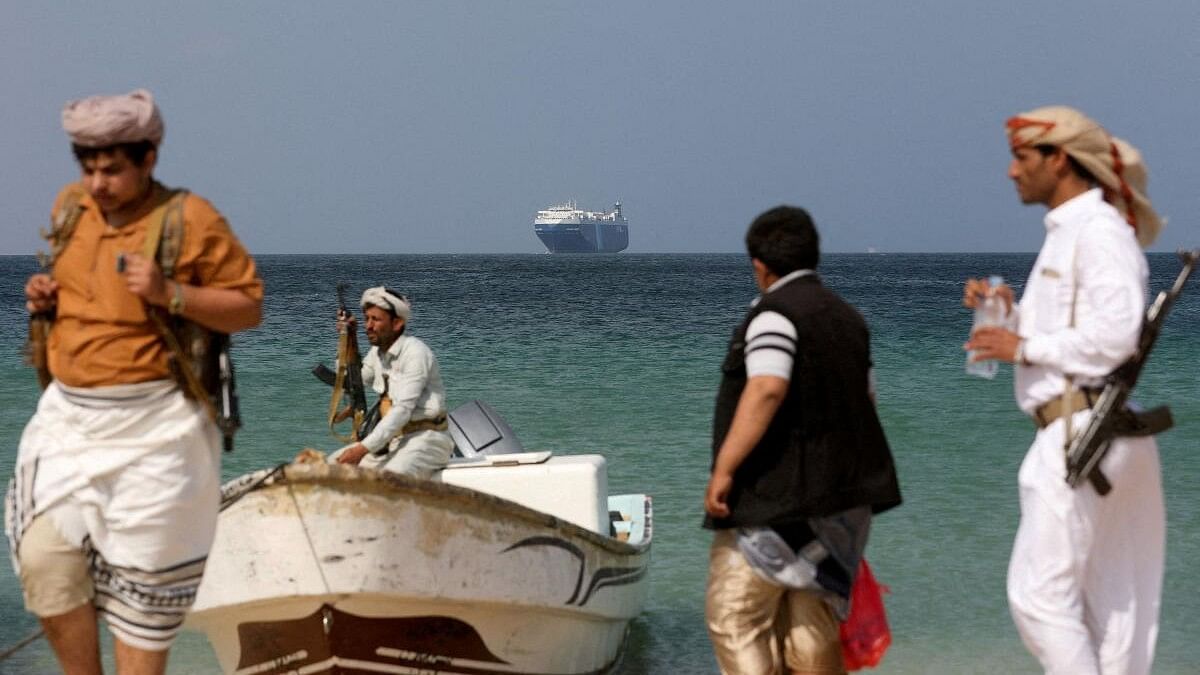
Armed men stand on the beach as the Galaxy Leader commercial ship, seized by Yemen's Houthis last month, is anchored off the coast of al-Salif, Yemen, December 5, 2023.
Credit: Reuters Photo
Iranian-backed Houthi militants in Yemen have stepped up attacks on vessels in the Red Sea to show their support for Palestinian Islamist group Hamas fighting Israel in Gaza.
The attacks, targeting a route that allows East-West trade, especially of oil, to use the Suez Canal to save the time and expense of circumnavigating Africa, have pushed some shipping companies to re-route vessels to avoid the area.
Two major freight firms including MSC, the world's biggest container shipping line, on Saturday said they would avoid the Suez Canal as Houthi militants in Yemen stepped up their assaults on commercial vessels in the Red Sea.
War risk insurance premiums have risen as a result of the Houthi attack on ships.
The Liberian-flagged MSC Palatium III was attacked on Friday with a drone in the Bab al-Mandab Strait off Yemen, at the southern end of the Red Sea, according to the Houthis.
No injuries were reported, but the vessel suffered some fire damage and was taken out of service, MSC said in a statement. Another Liberian-flagged vessel, Hapag Lloyd's Al Jasrah, was hit by a missile, the US military said.
Denmark's AP Moller-Maersk on Friday paused all its container shipments through Bab al-Mandab until further notice, and was joined on Saturday by the Swiss-based MSC and French shipping group CMA CGM.
"The situation is further deteriorating and concern for safety is increasing," CMA CGM said in a statement.
German container line Hapag Lloyd has said it might do the same.
How will this impact global trade and shipping industry?
As per experts, some Israeli-linked ships have started taking the South African route to avoid the Houthi menace. This delays the duration of the trip to 31 days from the usual 19 days, adding to the costs and logistical woes.
Meanwhile, the global oil market has downplayed the recent attacks. Crude oil prices have dipped and the market looks more worried about the drop in demand among advanced economies.
However, the major impact that the Houthi escalation has caused is the increased insurance costs for the shipping firms, reports VOA News.
Insurance costs have more than doubled for ship operators navigating through the Red Sea, which can add to thousands of dollars for the most expensive ships, said David Osler, insurance editor for Lloyd's List Intelligence.
While shippers are applying a so-called war risk charge of $50 to $100 per container to customers bringing over everything from grain to oil to things you buy off Amazon, that's a low enough fee that it should not drive up prices for consumers, he said.
Osler expects insurance costs to keep rising but said the situation would have to get a lot worse — such as the loss of several ships — to raise prices considerably and make some ship owners rethink moving through the region.
(With Reuters inputs)